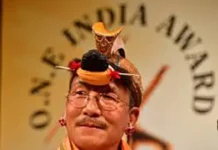Flights Of Fantasy
[ M Panging Pao ]
Recently India celebrated the 73rd Republic Day with pomp and gaiety. This year also marks the 75th year of India’s independence being celebrated throughout the country as Azadi Ka Amrit Mahotsav. This year the Republic Day parade was marked by the grand flypast of 75 aircraft by the Indian Air Force to mark the occasion. Arunachal’s tableau depicted the famous Anglo-Adi wars to honour Adi freedom fighters against British forces.
This year also marked the occasion of the 125th birth anniversary of Netaji Subhash Chandra Bose being celebrated as Parakram Diwas. Netaji Subhash Bose was an enigmatic leader who founded the Azad Hind Fauz and became the first prime minister of the Azad Hind government.
A maverick, Netaji’s saga includes dropping out of the prestigious Indian Civil Service despite securing 4th rank, travelling to Germany through Afghanistan, travelling in a submarine to Southeast Asia to form the Indian National Army (INA) alias the Azad Hind Fauz.
Netaji differed with Gandhi and Nehru about the means and ways of getting Indian independence. While Gandhiji espoused ahimsa or non-violence, Netaji was open to other ways, including military action. These differences led to Netaji donning the uniform himself and forming the INA/Azad Hind Fauz to fight for Indian independence. He achieved much success by forming the INA with about 60,000 troops and aligned the INA with the Japanese forces. After the Japanese captured the Andaman & Nicobar Islands in 1942, the Azad Hind government was formed in Ross Island of Andaman islands and Netaji unfurled the Indian tricolour at Port Blair on 30 December, 1943 – almost four years before Indian independence.
In Northeast India, Japanese forces overtook Imphal and entered Kohima in 1944. Colonel Shaukat Malik of the INA hoisted the Indian flag at Moirang near Imphal in Manipur on 14 April, 1944.
Post independence, Gandhiji and Nehru’s legacy was stamped in the Indian government and mindset. This legacy led to India emerging as a soft state. India has been plagued by continuous interference by neighbouring countries like Pakistan and China bleeding India continuously. National integrity and unity suffered. Even armed forces were expected to fight with one hand tied. India adopted soft concepts like non-aligned policy, no first use of nuclear weapons, Pansheel, Hindi-Chini Bhai Bhai, etc.
Netaji’s legacy has given us an alternate narrative – a narrative of standing firm, fighting for one’s own values, and defending one’s own territory/rights. This alternative narrative saw the emergence of a new, bullish India, ready to stand its ground, ready to talk and act tough.
This new narrative led to the earlier unimaginable surgical strikes inside Pakistan, abrogation of Article 370, etc. This new India looked China in the eye and hit back at Pakistan with strikes inside their territory.
India should leverage with Netaji’s legacy of strength and bold assertiveness on the path towards becoming a superpower. It is time for us to recognize, salute and adopt Netaji Subhash Chandra Bose’s legacy as a strong nation. Do you agree? (The contributor is retired Group Captain, Indian Air Force)


